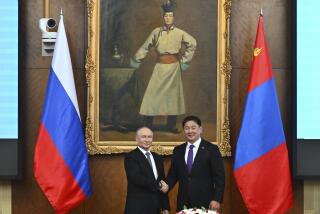Chinese Take Soviet Hint, Sign Mongolia Pact
- Share via
PEKING — The Chinese government announced Sunday that it has signed its first consular agreement with Mongolia, the Soviet ally along China’s northern border, in what is apparently an effort to clear the way for a possible withdrawal of Soviet troops from that country.
The Soviet troops in Mongolia, some of them less than 450 miles from Peking, have long been viewed by China as one of the biggest impediments to an improvement in Sino-Soviet relations. On July 28, in a major address on Asian policy in Vladivostok, Soviet leader Mikhail S. Gorbachev suggested that a “substantial” part of the Soviet force in Mongolia might be withdrawn.
Peking reacted quickly to the Soviet initiative. Last Thursday, Vice Foreign Minister Liu Shuqing was dispatched for talks in Ulan Bator, the Mongolian capital. Liu was the highest-ranking Chinese official to visit Mongolia in two decades, and, according to the official New China News Agency, the consular agreement was signed Saturday.
Rationale for Pullback
An upgrading of relations between China and Mongolia could provide a rationale for a Soviet troop pullback. The Soviet Union has repeatedly taken the position that it will not withdraw its troops from such Chinese neighbors as Afghanistan or Mongolia without the assent of the countries themselves.
The developments in Mongolia were the latest in a series of recent indications that China and the Soviet Union are exploring new steps towards rapprochement.
On Saturday, the Chinese Foreign Ministry confirmed that Soviet First Deputy Premier Ivan V. Arkhipov had just arrived in China for what was described as “medical treatment.”
Arkhipov was the main Soviet economic adviser to China during the Sino-Soviet alliance of the 1950s, and over the last two years, he has played a leading role in Soviet efforts to mend fences with Peking.
Mongolia, which for centuries was part of Chinese territory, gained its independence in 1921 and immediately signed a treaty with the Soviet Union. Until recently, relations between Mongolia and China have been tense. In 1983, Mongolia expelled an estimated 2,000 ethnic Chinese.
For the last quarter-century, the Soviet Union has stationed an estimated 60,000 troops in Mongolia, many of them in motorized infantry divisions along the 2,650-mile border between Mongolia and China.
In his Vladivostok speech, Gorbachev announced that “the question of withdrawing a substantial part of Soviet troops from Mongolia is being considered jointly by the Soviet and Mongolian leadership.”
It was one of several new overtures to China in Gorbachev’s speech.
“Much in international development depends upon these two major socialist nations,” Gorbachev said.
Even if the Soviets were to withdraw all of their forces from Mongolia, they would still have several hundred thousand troops along the 4,575-mile Sino-Soviet frontier in Central Asia and the Far East--the longest border of any two nations in the world.
But the Soviet troops in Mongolia are particularly close to the Chinese capital, and Mongolia itself has served as an important buffer between China and Soviet Siberia.
China has often said there are three “obstacles” to improvements in Sino-Soviet relations: Soviet support of Vietnamese troops in Cambodia, the Soviet invasion of Afghanistan, and the Soviet troops along China’s borders. But the Soviet Union has said it cannot bargain with China on matters concerning “third parties,” such as Mongolia.
Demand Was Rejected
In March, 1984, the Mongolian government said it “categorically rejects” the Chinese demand that the Soviet Union should withdraw troops from its territory.
But later that year, the longtime Mongolian head of state, Yumjaagiyn Tsedenbal, was suddenly replaced, and since then, as the Soviet Union has sought to improve relations with China, Mongolia has moderated its stand. Last year, Mongolia signed an agreement on border trade with China.
The New China News Agency said that Chinese Vice Minister Liu talked about “bilateral relations and some international issues” during his stay in Mongolia. It did not say whether the question of Soviet troop withdrawals was discussed and did not provide details about the new consular agreement.
More to Read
Sign up for Essential California
The most important California stories and recommendations in your inbox every morning.
You may occasionally receive promotional content from the Los Angeles Times.













